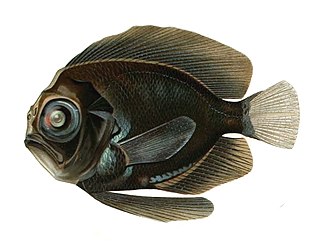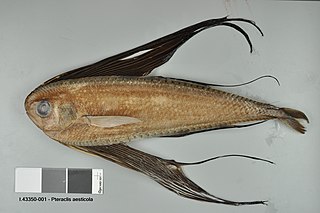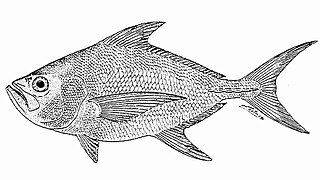
The Chiasmodontidae, snaketooth fishes or swallowers, are a family of deep-sea predatory ray-finned fishes, part of the order Scombriformes, that are found in all oceans.

Caristiidae, the manefishes, are a family of scombriform ray-finned fishes which today includes 19 extant species distributed in four genera. Chalcidichthys malacapterygius and Absalomichthys velifer are extinct species in this family from the Upper Miocene of Southern California.
The squaretails are a genus, Tetragonurus, of scombriform ray-finned fishes, the only genus in the family Tetragonuridae.

Ariomma is a genus of deepwater, marine ray-finned fishes belonging to the family Ariommatidae. Members of this genus are found in the Atlantic, Pacific and Indian Oceans. Several members of this genus are of commercial importance as food fish. This genus is currently the only known extant genus in its family.

The bullet tuna is a species of tuna, in the family Scombridae, found circumglobally in tropical oceans, including the Mediterranean Sea, in open surface waters to depths of 50 m (164 ft). The population of bullet tuna in the Eastern Pacific was classified as a subspecies of A. rochei, A. rochei eudorax, but some authorities regard this as a valid species Auxis eudorax. Its maximum length is 50 centimetres (20 in).

The spiny turbots are a family, Psettodidae, of relatively large, primitive flatfish found in the tropical waters of the east Atlantic and Indo-Pacific. The family contains just three species, all in the same genus, Psettodes. The common name comes from the presence of spines in the dorsal and anal fins, which may indicate an evolutionary relationship with the Perciformes. They are less asymmetrical than other flatfish, although the region around the eyes is twisted. They reach lengths of 55–80 cm (22–31 in).

The Kanadi kingfish is a species of ray-finned bony fish in the family Scombridae, the mackerel family. Also known as the Kanadi seerfish, queen mackerel, or spotted mackerel, it is found in subtropical waters of the western Indian Ocean, Seychelles, Kenya and Zanzibar to South Africa and along the west coast of Madagascar. Kanadi kingfish commonly occur in depths of 50 to 200 m. Specimens have been recorded at up to 120 cm (47 in) in length, and weighing up to 12.5 kg (28 lb). They feed mainly on small fishes such as anchovies and clupeids, squids, and mantis shrimps.

Sarda is a genus of medium-sized, predatory ray-finned fish in the family Scombridae, and belonging to the tribe Sardini, more commonly called the bonito tribe. There are four species which comprise the genus Sarda. One of those species, the Pacific bonito, is further divided into two subspecies.

Schedophilus is a genus of ray-finned fish in the family Centrolophidae, the medusafish. The genus has a global distribution.

Orcynopsis unicolor, the plain bonito, is a species of ray-finned, bony fish in the bonito tribe of the mackerel family (Scombridae). It occurs in the eastern Atlantic from southern Norway, where it is a vagrant, to Senegal, although it is not found in the seas around the Macaronesian Islands. It is also found in the Mediterranean Sea and extends to the Black Sea.
Barnardichthys fulvomarginata, the lemon sole, is a species of sole endemic to the coasts of South Africa. This species is the only known member of its genus.

Synapturichthys kleinii, Klein's sole or lace sole, is a species of economically important sole. It is the only known member of its genus.

Pteraclis is a genus of ray-finned fish in the family Bramidae, the pomfrets. They are known commonly as fanfishes. The three species are distributed throughout the oceans of the world.

Taractes is a genus of marine ray-finned fishes from the family Bramidae, the pomfrets. Taractes can be distinguished from other bramid genera but having a flat, or slightly curved profile, between the eyes and by having scales on both the dorsal and anal fins.

Taractichthys is a genus of marine ray-finned fishes from the family Bramidae, the pomfrets.

Caristius is a genus of manefishes native to the Atlantic and Pacific Oceans.
Neocaristius heemstrai is a species of fish in the family Caristiidae, the manefishes. It is native to the oceans of the southern hemisphere where it is known to occur at depths of from 420 to 1,360 metres. This species grows to a length of 11.8 centimetres (4.6 in) SL.

Platyberyx is a genus of manefishes native to the eastern Atlantic Ocean.

Scombriformes, also known as Pelagia and Pelagiaria, is an order of ray-finned fish within the clade Percomorpha. It contains 287 extant species in 16 families, most of which were previously classified under the suborders Scombroidei and Stromateoidei of the order Perciformes.

Stromateus is a genus of ray-finned fish from the butterfish family Stromateidae, of which it is the type genus.















